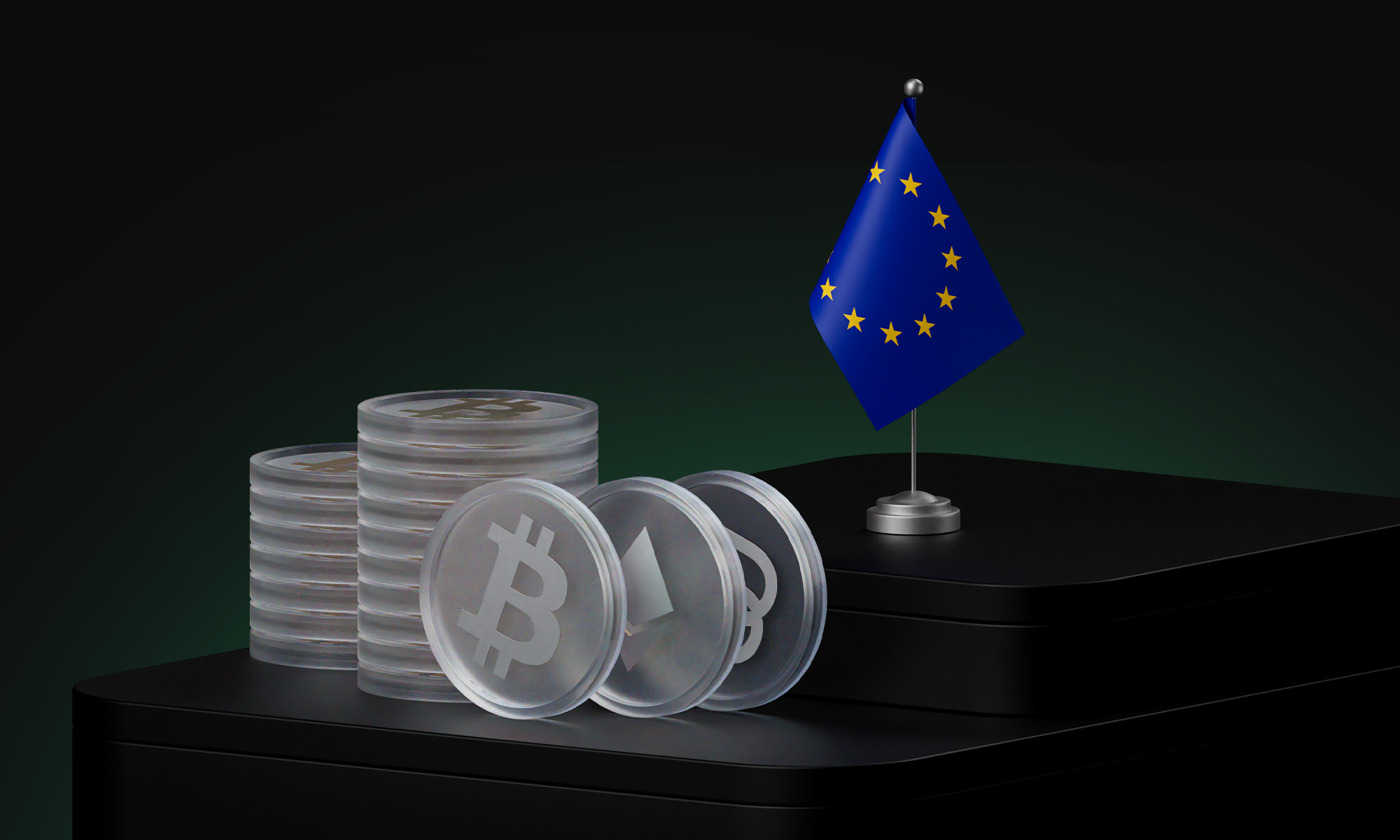Growth beyond regulation: Fear and misconceptions
As with any new technology, the regulatory world is generally not prepared for it. Often, exponential growth and adoption leave regulation behind. Unsurprisingly, this was the case for the crypto industry not only in the EU but worldwide. Until now, the crypto scene was unregulated, fragmented, and novel, which created fear and concern. As with any new and disruptive technology, unfortunately, the dark side of human nature kicked in as we saw several despicable exploitations and the wrongful misuse of crypto assets and blockchain technology. Nevertheless, this should not distract from the positive impact of crypto assets and industry on society. Media headlines that called for stricter crypto regulations had the unintended consequence of stifling innovation with further suggestions of a complete ban also prominent.
Regrettably, this reaction has created strong negativity, misunderstanding and movement against crypto in various public and private environments. These under-researched perspectives are typically excessive and overstated due to their one-sided nature and lack of proper understanding. Bitpanda has always been compliant with the applicable rules and follows the regulatory compliance & security first principle, but there was no suitable framework for our philosophy to operate within, causing much friction and additional hurdles to overcome. Furthermore, it was evident that other players did not always “play by the existing rules'' and followed different principles. This had an adverse impact on the competition and industry.
Given all of this, the crypto industry did not receive a warm welcome and these events triggered the difficult task of creating a new crypto regulatory regime.
Ultimately, there were two major issues at stake:
Clear and workable rules that foster innovation and reflect the proper understanding.
The protection of customers and compliant crypto firms against harmful and wrongful actions by ill-intentioned individuals and business practices.
The current status quo - fragmentation and uncertainty
Bitpanda is fully compliant with the existing regulatory regime that is focused on the requirements for anti-money laundering (AML) and countering the financing of terrorism (CFT), which is confirmed by our numerous crypto registrations and/or licences in various jurisdictions across the Europe (regulatory compliance & security first).
These rules are based on the 5th EU Anti-Money Laundering Directive (AMLD5). This means that Member States (MS) have discretion regarding how they will implement the rules in their legal systems - this is the so-called ‘Minimum Harmonisation of rules’, which can lead to regulatory fragmentation in terms of treatment and governance. In addition, some EU countries have introduced their national regulations on crypto assets. Importantly, these regulations originate from the traditional finance sector (TradFi) including rules such as MiFID II. Therefore, banks and other financial institutions have no dedicated provisions for the nascent crypto industry.
In most countries, AMLD5 requires registration with a national competent authority. Firms need to present and comply with a certain degree of AML and CFT organisational set-up. And this is the issue. Given the absence of a harmonised and dedicated crypto regulatory regime, combined with market developments influencing internal positions, some MS have introduced their own additional national rules (specifically registration or licensing framework) that go beyond AMLD5. Inevitably, all of this has led to a fragmented and unharmonised regime for crypto markets across the EU, where different standards, interpretations and divergent approaches prevail. The imbalance in the regulatory sphere and reverse solicitation of approaching clients by non-compliant players has been prevalent.
MiCA's arrival: Neo - the chosen one
The legislative process took many years, but we are finally here. The EU introduced a dedicated regulatory regime for crypto assets - the Markets in Crypto Assets Regulation (MiCA) to address the regulatory vacuum, provide solutions, and set the EU political trajectory for the crypto industry. Importantly, the EU opted for “Regulation”, which means full harmonisation, unlike the above-mentioned Directive. Some parts of MiCA will be applicable at the end of June and others at the end of December 2024.
What should we think of MiCA? Well, one of the Members of the EU Parliament who worked on its preparation as a Rapporteur said:
“Today, we put order in the Wild West of crypto assets and set clear rules for a harmonised market that will provide legal certainty for crypto asset issuers, guarantee equal rights for service providers and ensure high standards for consumers and investors. So far, crypto assets, such as cryptocurrencies, have been out of the scope of European legislation and too often, divergent laws exist in Member States”
In essence, MiCA addresses the missing regulations and provides the needed protection for customers and crypto firms. In other words, MiCA sheds light on the industry and brings a balanced legal framework - though it is important to note that MiCA does not aim to cover everything. Certain topics such as NFTs, DeFi, or lending (staking) are excluded from the scope as they are subject to further assessment of the functioning of the markets in crypto assets in the EU, based on market developments and trends, by policymakers and regulators. Additionally, issues concerning the environmental and climate footprint, especially of Proof of Work, are also subject to further assessment (a topic that is, unfortunately, misunderstood).
What does it mean for Bitpanda?
MiCA is the culmination of the industry's efforts to bring about a balanced and tailor-made regulatory framework for crypto assets in the EU, for which Bitpanda has advocated for many years. MiCA puts the EU as the global leader and standard-setter for the crypto industry, whereas other jurisdictions are still exploring their strategies including regulation by enforcement in the U.S.
The following elements outline what MiCA means for Bitpanda and our customers:
Legal clarity and certainty: Previously, we were operating in unknown territory but now there are clear rules for Crypto Assets-Service providers, issuers of Stablecoins (MiCA designates them as Assets Referenced Tokens and E-Money Tokens), Trading Platforms and other crypto assets. Furthermore, there is now:
Clear licencing and authorisation
Guidelines on interpretation and classification of different crypto assets
Prohibition of reverse solicitation (and guidelines on this), meaning a firm cannot approach clients without a licence in the EU (unless clients acted upon their own exclusive initiatives)
Harmonisation of rules and practices: This eliminates fragmentation and regulatory arbitrage (different rules per country)
Passporting: One licence for all EU MS and not 27 different licences and/or registrations
A level-playing field for everyone: EU providers and those from outside the EU cannot operate without the licence
Technology-agnostic approach: The focus is now on stimulating innovation rather than banning the crypto industry and its underlying technology
An equal footing with TradFi: Non-discrimination between TradFi and the crypto industry by removing differential treatment
Recognition of the crypto industry: Crypto is here to stay and there needs to be an operational and balanced framework for it to grow. Facts, impartiality and understanding should be the primary focus rather than a blatant ban, negative classification or excessive limitations
What does it mean for investors?
Under the previous setup, there was no legal requirement for customer protection. However, Bitpanda has always gone the extra mile (regulatory compliance & security first), and provided customers protection by safeguarding the ownership of funds and digital assets (crypto, stocks, and commodities), which protects against, for instance, insolvency or hacks. In other words, customer funds protection and real ownership; setting a new standard across the industry.
Now, MiCA has changed this loophole by granting rights and protections to investors. At the same time, it imposes wide obligations on the crypto industry against potential further despicable shortfalls committed by ill-intentioned individuals and entities, such as the notorious FTX and TerraLuna collapses. Examples of such obligations are prudential requirements or a wide set of governance and reporting standards and accountability.
Here, are several important examples of investor protection:

It’s only the beginning…
The preparation of any legislative act is just one side of the coin. The other side crucially being implementation, enforcement, and everyday use. Furthermore, the importance of increased cooperation of national competent authorities with the industry and EU agencies together with policymakers cannot be understated, especially given the context of the nascent and fast-growing crypto industry, which continues to battle misinformation and misconception. Therefore, we have had partial success in bringing MiCA to life - now we need to see how it will grow: moving from laying down the foundation to operational usage.
MiCA is the next phase in further growth and adoption of the crypto sector and crypto assets both by retail and institutional investors as well as the TradFi sector in general. MiCA can be seen as a “seal” that the crypto industry is here to stay and reshape the existing financial world in a regulated and secure manner. Even though it has not been implemented yet, there are already discussions about extending its scope. In any event, the EU authorities are in charge of later revisions as prescribed by MiCA itself. We will therefore see a number of reports on the crypto assets market development, MiCA functioning and potential new requirements incoming. Though a simple point, it confirms that even though the regulatory framework is more advanced, it is still just the beginning.
Disclaimer
This article does not constitute investment advice, nor is it an offer or invitation to purchase any digital assets.
This article is for general purposes of information only and no representation or warranty, either expressed or implied, is made as to, and no reliance should be placed on, the fairness, accuracy, completeness or correctness of this article or opinions contained herein.
Investing carries risks. Make sure to conduct your own research before making any investment.
 Commodities* Invest in commodities 24/7
Commodities* Invest in commodities 24/7 BITCOIN What to know when you are just starting to invest
BITCOIN What to know when you are just starting to invest ASSET MANAGEMENT Your investment, your assets: Why your money is safe with Bitpanda
ASSET MANAGEMENT Your investment, your assets: Why your money is safe with Bitpanda COUNTDOWNBitcoin Halving Countdown 2024
COUNTDOWNBitcoin Halving Countdown 2024 ACADEMYWhat is the Bitcoin halving?
ACADEMYWhat is the Bitcoin halving?







